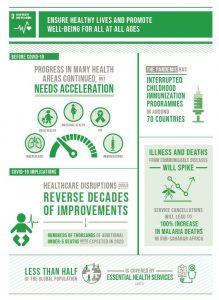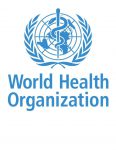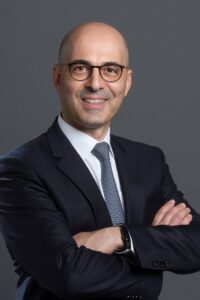Accelerating access to health
The COVID-19 pandemic has been a stark reminder – if any were needed – of humankind’s persistent failure to address one of its most enduring, and potentially destabilizing, challenges – universal access to healthcare.
While we can be proud of many of the advances made by our society over the past century and more, our inability to ensure that every individual has access to good quality healthcare is an undoubted ‘black mark’ on our progress.
 As the UN powerfully states in its definition of Sustainable Development Goal 3 (Good health and well-being): “Ensuring healthy lives and promoting well-being at all ages is essential to sustainable development.”[1]
As the UN powerfully states in its definition of Sustainable Development Goal 3 (Good health and well-being): “Ensuring healthy lives and promoting well-being at all ages is essential to sustainable development.”[1]
It goes on to say: “By focusing on providing more efficient funding of health systems, improved sanitation and hygiene, and increased access to physicians, significant progress can be made in helping to save the lives of millions.”[2]
Before the pandemic, major advances were being made in improving the health of millions of people across the globe. Life expectancy was increasing and the risks from some of the common killers associated with child and maternal mortality were reducing. But much more is needed to fully eradicate a wide range of diseases and address many different persistent and emerging health issues.
Some 2019 statistics from the World Health Organization’s Universal Health Coverage initiative serve to illustrate the scale of the problem[3]:
 At least half of the World’s population still do not have full coverage of essential health services.
At least half of the World’s population still do not have full coverage of essential health services.- About 100 million people are still being pushed into extreme poverty (defined as living on US$ 1.90 or less a day) because they have to pay for health care.
- Over 930 million people (around 12% of the World’s population) spend at least 10% of their household budgets to pay for health care.
For several years already, Abdul Latif Jameel and, in particular the Jameel family’s global philanthropy, Community Jameel have been helping to address some of these issues by making healthcare more accessible and available through its research labs, the Jameel Institute, or J-IDEA (the Abdul Latif Jameel Institute for Disease and Emergency Analytics) at Imperial College London; the Jameel Clinic, or J-Clinic (the Abdul Latif Jameel Clinic for Machine Learning in Health) at MIT; and J-WAFS (the Abdul Latif Jameel Water & Food Systems Lab), also at MIT.
As vital as this leading-edge research is, however, it is essential that innovation, expertise and new technologies are transferred out of the labs and into real-world action.
That is why Abdul Latif Jameel established the Abdul Latif Jameel Hospital in 1995, the first non-profit rehabilitation hospital in Saudi Arabia, providing comprehensive care for adults and children. It’s also why it is putting so much energy behind its collaborations with Japanese companies Cellspect and Cyberdyne and the start-up incubator JOMDD.
With Cellspect, it is helping to provide speedy and affordable blood testing in developing countries across the Middle East, Africa, Southeast Asia and India with an innovative, low cost and highly portable point-of-care-testing (POCT) device. The biomechanical finger-pricks currently check sugar metabolism, lipid and liver function – delivering results in just five minutes.
Meanwhile, a newly-expanded partnership with Cyberdyne, which specializes in pioneering spinal injury rehabilitation technology using robotic exoskeletons in its HAL® technology, will allow it to roll-out this technology to patients across the Gulf region and establish the Abdul Latif Jameel Hospital as a specialist regional center of excellence in training.

Chief Executive Officer, Abdul Latif Jameel Health
Now, as the world continues its efforts to combat the pandemic, Abdul Latif Jameel has substantially expanded its commitment to improving global access to healthcare with the establishment of Abdul Latif Jameel Health.
Headed by Dr Akram Bouchenaki, formerly an executive director at healthcare giant Gilead Sciences, Abdul Latif Jameel Health is dedicated to bringing better health to wider areas of the developing world; investing in projects, partners and products that will enhance the lives of greater numbers of people and help to improve access to healthcare for those who need it most.
We spoke to Akram about his new role, the opportunities for Abdul Latif Jameel Health and his vision for the future.
What is your previous experience in the healthcare sector?
I have a science and medical background. I’m a doctor in pharmacy by training, so my early years were mostly working with drugs, dispensing them, exploring new drug innovations. A little later I moved over to the commercial side of the healthcare industry when I joined first Glaxo and then Bristol-Myers Squibb, both in France, where I was brought up.
In 1999, I was recruited to the United States by an upcoming company called Gilead Sciences in California. I was hired to work on the first launch of its HIV compound, called Tenofovir, which has since become the widest-used drug for the treatment of HIV. Gilead itself has since become one of the largest healthcare companies in the world.
I came back to Europe to help develop Gilead’s European operations in 2003, first in Paris and then London. After doing that for a few years and helping to develop this relatively small Californian start-up into a hugely successful global company, my own entrepreneurial ambitions kicked in. I left to build a venture-backed company called Moksha8, a specialty pharmaceutical company focused on licensing and marketing innovative and established therapeutics in Latin America.
It’s a Sanskrit name which means the path to liberation and enlightenment, which reflects the idea behind the company. Our aim was to try to free people from disease in emerging markets – a fundamental ambition that ties in very closely with our objectives at Abdul Latif Jameel Health.
In 2017, I re-joined Gilead to work on its Africa program, helping to expand access to vital therapeutics in markets where people struggled to access good quality healthcare. I was working with products such as antiviral therapies against HIV and hepatitis B and C, trying to accelerate access to these life-saving therapies for the people who really needed them. So, my job was to work with governments, with healthcare authorities, with local partners, to register and make these drugs more broadly available. We adopted a very innovative tiered pricing approach to ensure products were being made accessible in lower-income countries – which is where the greatest need often is.
You could have enjoyed a successful, comfortable career based in a lab or office in the US, but instead you’ve focused on helping to improve people’s lives through better access to drugs and treatments. Where does that commitment come from?
I’ve always been driven to engage with broader healthcare issues. Even early in my career I was aware of the gap that exists in access to healthcare between developed nations and the developing world, which accounts for the majority of the population on the planet. I oriented my career towards addressing these kinds of issues. And it’s a continuing battle.
There were medics and healthcare workers in my family, and that definitely played a role in the forming of my desire to address these issues. Even during my studies, I was eager to experience different environments. I spent part of my time in Valencia, Spain, at the Doctor Peset hospital. Then I went to the United States and did part of my training at the MD Anderson Cancer Center in Houston, Texas. So, the international side of things always interested me, and has always been a motivation.
How was this reflected in your previous roles?
One of the most important dynamics I was involved with within Europe and the United States was the treatment of HIV. It was a very visible and acute issue, with not only healthcare elements to it, but deep society-related issues as well. The industry played a really important role in rapidly developing new drugs, and particularly in terms of the speed at which they were made available to the market. It was unprecedented for any disease area. But at the same time, you could also see a huge gap between Europe and North America, and those countries where the epidemic was at catastrophic numbers, particularly in sub-Saharan Africa. That early exposure to this issue drove me to the type of work and roles I have taken since.
What attracted you to the opportunity at Abdul Latif Jameel Health?
There were two key factors.
On a personal level, as my career to date has shown, I have an appetite for building new projects and opening new doors. I spent a lot of my early years in healthcare introducing and launching new drugs to the market – drugs that have changed people’s lives in a significant way, whether it be in HIV or in hepatitis. Most recently, I was leading the launch of a drug in Egypt for the treatment of hepatitis C that cures people 98% of the time, which is quite remarkable for an anti-infectious drug. So that aspect was definitely was an attraction.
I’m incredibly excited by the international dimension, by the challenge of connecting with people and organizations across different markets. When you’re dealing with healthcare issues, you’re dealing with the deepest and most meaningful aspects of people’s lives, and that is incredibly motivating.
I had come across Abdul Latif Jameel during my work, particularly through Community Jameel’s philanthropic involvement in various projects in Africa and the Poverty Action Lab at MIT. The opportunity to bring these strands together and start up a new company, backed by the expertise and resources of Abdul Latif Jameel and the vision of Mr. Mohammed Jameel, was one I could not pass up. I realized that a family, a philanthropy and a business with that perspective and desire to push things in that direction can do great things.
Does Abdul Latif Jameel’s ambition to improve healthcare and medical care in developing markets align with your own interests in this area?
Yes, absolutely. There is a shared vision to do good while doing well that definitely resonated with me. Obviously, the commitment to doing good must be sustainable – there must be a commercial benefit – but the opportunity to do that while having a meaningful impact on people’s lives is a fundamental goal.
It is early days, but what is your vision for Abdul Latif Jameel Health and for helping to achieve these objectives?
The vision is already forming, based on a few key principles. First, I think it’s obvious there is a need for a 21st Century health distribution company, particularly in the parts of the world we’ll be focusing on (Africa, South East Asia, Middle East, etc). In this respect we want to be an accelerator for access to the best possible healthcare solutions available, and for the broadest possible access to health wherever needed.
While doing that, we also want to be an interlocutor for healthcare systems across the territories where we operate, and we have the vision to be best-in-class for our partners. The partnership aspect is in the DNA of Abdul Latif Jameel and is a key component of the vision.
Finally, we have to operate with the highest possible standards of ethics and integrity in everything we do. It is people’s lives we are dealing with.
It’s about more than getting the drugs to market. There are social, cultural, political and technical challenges, too. Is that multi-dimensional aspect part of the attraction for you?
I think so, yes. It’s a complex puzzle that requires a very deep understanding. This is one of the key differentiators in what Abdul Latif Jameel Health will provide. You need to have a very deep and fine understanding of both sides. You need to understand what innovative healthcare companies need from their partners in certain parts of the world, and you also need to understand what the markets and their respective healthcare systems require to address their healthcare challenges. Abdul Latif Jameel Health is very well placed in this sense. Abdul Latif Jameel has proven over 75 years its ability to build partnerships at all levels across multiple industries, to understand different markets and, crucially, to deliver what those different markets need to meet local expectations. We want to replicate this model in the healthcare industry.
How important are the support, expertise and resources of Abdul Latif Jameel to the success of Abdul Latif Jameel Health?
Abdul Latif Jameel benefits from a long and successful history in large parts of the world. We want to leverage that heritage and track record of success across different industries. In practical terms, we can take advantage of the systems and set-ups that have been put in place over the years to accelerate the build-up of our own healthcare infrastructure. So there is a heritage and positioning angle that we can benefit from, which is important when it comes to building relationships with partners and establishing confidence and trust. Also it is a significant operational benefit, in terms of an existing global network, with deep knowledge and understanding of how businesses operate in various parts of the world.
How important a role could the health-focused Community Jameel labs at MIT (Jameel Clinic) and Imperial College (Jameel Institute) play in Abdul Latif Jameel Health’s development?
To be honest, we see these as two very separate universes. One is focused on the philanthropic and social responsibility front, helping to drive upstream research at the root cause level – which is the Community Jameel work, and the other – Abdul Latif Jameel Health – definitely is a business with a purpose, but also has a more traditional, commercial focus. So, they are two very different initiatives, and we’ll keep them that way, but it is clear there is a unifying philosophy from the Jameel family to build a better world underlying both.
However, you rightly allude to the amazing innovations that are being developed by these brilliant researchers. I am aware of only a fraction of the projects that are ongoing, but it’s quite remarkable, and the potential of some of these projects is very exciting. I would hope that in the future some of these innovations would make it to market and, when they do, we would be in a good position to actually take them to the people who need them. So, yes, I hope that flow of innovation and ground-breaking scientific advancement continues in the various initiatives that are funded by Community Jameel, and that ultimately, we could contribute to making them more available to people.
Finally, looking ahead, what are your priorities for Abdul Latif Jameel Health over the next six months?
The first objective is to build a best-in-class team, so we can rapidly tap into the opportunities we see, both in terms of opportunities for partnering, but also in terms of markets to enter. Secondly, we want to build our presence on the ground in key geographies, in terms of both our own infrastructure and also partnering with trusted local partners. And thirdly, we want to establish partnerships with best-in-class therapeutics and diagnostics companies who will entrust us with their assets to make available in different markets. These are our priorities for the short term, and I’m delighted that we are already making great progress across all three areas.
[3] https://www.who.int/news-room/fact-sheets/detail/universal-health-coverage-(uhc)





 1x
1x

 Added to press kit
Added to press kit


